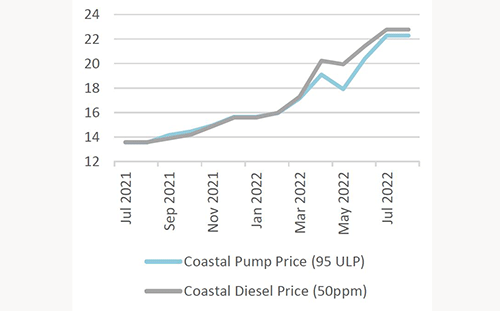The energy ministry has decided to reinstate the fuel tax of 90 cents a litre on all petroleum products while keeping the levy reductions in place for the Motor- Vehicle Accident Fund, road user charges and the National Petroleum Corporation of Namibia (Namcor) until further notice. This is as the fuel price was left unchanged for August at historical highs of N$22.28 for petrol and N$22.77 for diesel.
Also, in response to strong demands by local fuel retailers, the ministry resolved to increase the dealer margin by 50 cents from N$1.13 per litre to N$1.63 per litre. These changes will become effective as from 3 August 2022.
“The ministry wishes to inform the public that the decisions taken above are aimed at creating stability within the oil market to ensure the security of fuel supply in the country,” read a ministerial statement issued on Friday.
The latest calculations by the ministry indicate that the average price for Unleaded Petrol 95 from 1 July to 22 July 2022 stood at US$130.463 per barrel (compared to US$159.267 per barrel at the end of June 2022). This represented a decrease of about US$29 over the review period.
Additionally, the average price for Diesel 50ppm over the same period stood at US$141.547 per barrel (compared to US$170.252 per barrel at the end of June 2022), also decreasing by US$29 per barrel over the period.
“Since mid-June 2022, international crude oil prices have fallen by nearly 20%, amid rising fears that the aggressive interest rate hikes implemented by many central banks, including the Federal Reserve, could lead to a recession in major developed economies. Despite that, tough issues related to the energy transition and geopolitical uncertainty will yet continue to linger over the oil market into the future. However, at the present time, the oil prices are at least falling due to the need to address the high fears of a global economic recession,” the ministry added.
Friday’s statement also noted the depreciation of the Namibia Dollar against the US Dollar. During the review period, the local currency depreciated against the US$ at N$16.8832 per US$ (compared to N$15.8245 per US$ at the end of June 2022).
“This currency depreciation usually has a negative effect on the import parity price calculations and the local pump prices of fuel. However, this time around, it is outweighed by the significant decreases in the barrel prices,” the ministry observed.
According to the ministry’s fuel pricing model, it recorded high over-recoveries on the two respective products, namely an over-recovery of 174 cents per litre on petrol and an over-recovery of 117 cents per litre on diesel. These over-recoveries were mainly recorded due to a significant decrease in oil prices per barrel.
For the year to date, the energy ministry has incurred a net under-recovery of N$5.76 on petrol and N$6.94 on diesel. According to local analysts, this implies that if the National Energy Fund (NEF) did not subsidise under-recoveries during 2022, Namibia would currently have petrol and diesel prices of N$28.04 and N$29.71, respectively.
Meanwhile the Organisation of Pertroleum Exporting Countries (OPEC) and participating non-OPEC member states decided on 30 June 2022 to increase their daily production target by 648 000 barrels per day during July 2022 and August 2022. While still below the necessary levels to meet demand, this increase is higher than the adjustments of 400 000 and 432 000 bpd seen in earlier months. The next OPEC meeting will be held on 3 August 2022, where it is expected for production targets to remain unchanged.
Meanwhile, local stock brokerage Simonis Storm noted that the South African Rand, to which the Namibia Dollar is pegged, usually weakens during the third quarter of each year, and typically strengthens in the fourth quarter.
“While oil market fundamentals should keep global oil prices high, recessionary fears and subsequent reduced demand for oil implies that oil prices could fall further. We, therefore, see risks to additional fuel price hikes in Namibia to be balanced,”Simonis Storm reasoned.


